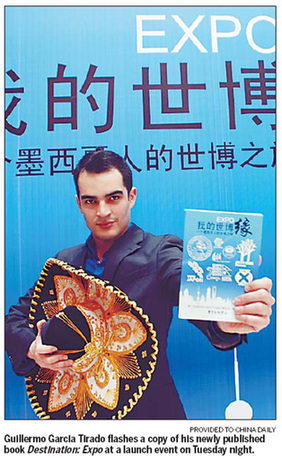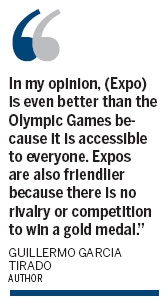Society
Memo from Mexico signals new literary wave in China
By Matt Hodges (China Daily)
Updated: 2010-04-01 08:41
 |
Large Medium Small |
SHANGHAI - A new Chinese-language book about a Mexican journalist's personal experience of the past five World Expos, up to Zaragoza 2008 in Spain, could mark the start of the next literary trend as millions of foreigners clamor to study Mandarin.

Destination: Expo by Guillermo Garcia Tirado does not exhibit the literary prowess of Lu Xun (1881-1936), considered the founder of modern Chinese literature. It also skims over the first 130 years of World Expos, unlike the detailed World of Exposition Reader by the Shanghai Information Office.
But what makes it unique is Garcia's infectious passion for Expo, and China, and its more contemporary focus, while showing how foreign writers are beginning to key into the Chinese market. He even divided the book into eight chapters for Chinese-style good luck.
Garcia, who goes by the nickname Memo, and who stylizes his signature to look like a bicycle, claims it is the first book ever published directly in Chinese by a Mexican - albeit with the aid of a Shanghainese translator.
"It's a tool for better appreciating the Expo," said the 27 year old, who has been a fanatic of the World's Fair since attending Seville 1992, at the age of nine.
"Many Chinese visitors have no idea what to expect (of Shanghai 2010), but this gives them a background and a personal narrative," he said.
With all its trivia and tidbits - visitors were able to climb up the right arm of the Statue of Liberty at Philadelphia 1876, for example - pop-quiz lovers will appreciate it, but will your average Chinese?
"Chinese people tend to pay attention to the technical side, such as how the pavilions are built, because the media leads them to that, whereas Westerners are interested in the event and the party aspect," said Jesse Jia, who spent five months translating the book. "I wanted to combine both."
At 22 yuan ($3.22) a copy, it's affordable and easy to read. Garcia humanizes what for many is a bewildering event and stresses that Expo "is by no means a trade fair like the Canton Fair", while explaining its relevance and how much fun it can be.
He also reminds readers of the heritage and relevance of Expo, which was born in the 1850s as a battle for bragging rights between colonial powers England and France, before it went global the following century.

"I get the impression he's taken this (Shanghai) Expo as a shift between the old world and the new, but I can't read it so I don't know," said Pete Ford, creative director of the Australian pavilion.
Shanghai Expo books are hardly thin on the ground these days - 73 English-language books on the subject were displayed at last year's Frankfurt International Book Fair alone - but Garcia's is more personal. In this respect it is closer to World Expo and Me by former Chinese Ambassador to France Wu Jianmin.
As Ted Allan, honorary president of the Bureau of International Expositions, once said: "World's Fairs are the intellectual equivalent of the Olympics." China flexed its muscle in 2008 at the Beijing Games. Now in 2010 it is using its brain and, said Garcia, so should we.
"In my opinion, (Expo) is even better than the Olympic Games because it is accessible to everyone," Garcia said.
"Expos are also friendlier because there is no rivalry or competition to win a gold medal."







